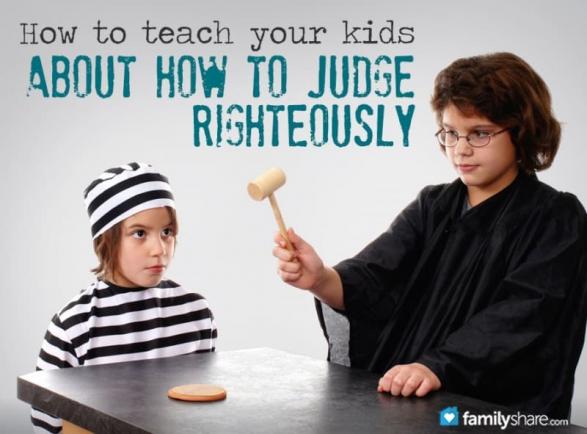
Thomas S. Monson, president of a worldwide religious organization told a short anecdote about judging others. He talked about a woman who looked out her windows at her neighbor's laundry hanging on the clothesline. Daily she told her husband their neighbor's laundry was still dirty, and remarked her neighbor did not know how to wash. This happened repeatedly until one morning she looked out the window and exclaimed with surprise her neighbor's laundry was finally clean. "Her husband replied, 'Well, dear, I have the answer for you. You'll be interested to know that I got up early this morning and washed our windows!'"
Monson goes on to say, "None of us is perfect"¦And yet for some reason despite our own imperfections, we have a tendency to point out those of others"¦ There is really no way we can know the heart, the intentions, or the circumstances of someone who might say or do something we find reason to criticize. Thus the commandment, 'Judge not.'"
Parents teach best by example. What do your children hear you say? When you pass someone with a cardboard sign, do you talk about how difficult life can be, or do you pass quick judgment?
Perhaps the best way to teach children to judge righteously is to, "Judge not," ourselves and lead by example. Perhaps it is too late and you have been guilty of verbally complaining about, or judging, your friends and neighbors in front of your children. If so, then this is a good time to make a change and begin teaching your children to see the world through Christ like eyes or as the most compassionate judge of all sees it.
Here are some tips for teaching children righteous judgment.
Teach empathy
When another child scrapes a knee or gets hurt, involve your child in the compassionate care of the patient. Point out the injured child's pain. Have your child give hugs, get Band-Aids and help nurse the patient. Set an example of empathy and involve your child by having them help others in physical or emotional pain.
Teach compassion and altruism
Altruism is defined as the unselfish regard or devotion to the welfare of others. The American Psychological Association explained that, by example, parents teach children to help in communities and to serve others. When children serve others and have compassion toward others, they are more likely to care and less likely to bully. Set up opportunities for older children to serve in their community. A friend of ours takes his family to a local shelter to serve food to the homeless every Thanksgiving.
Monitor what you say about others
Children listen to how you speak about others. Speak about others with compassion at all times. You never know when kids are listening. Your behavior will be the model for how your kids will treat their friends. If you see your children saying unkind things about friends, go to the mirror and review what you have said about your friends.
Teach children that bad things happen to good people
Sometimes things happen that are not our fault. Teach children that everyone gets to make choices. Sometimes someone else's choices hurt people. When we do this, we give children tools for healing when bad things happen to them.
For example, when a drunk driver killed a friend, people at the funeral spoke softly to the widow, trying to make sense of what had happened. They said things like, "There must be a lesson from God in all this." Although people were trying to comfort the widow, their statements implied that she had control. If she only learned her lesson everything would be alright. Let children know that sometimes people make choices that hurt us and it is not our fault.
Teach children not to jump to conclusions
A man dressed in old clothes, took a piece of cardboard and wrote a sign, like signs we see held by homeless and struggling people all over America. They read, "Need help please," or "Need rent money." He sat in the driveway of a church parking lot, and watched a large crowd as they passed him. He noted every reaction from rudeness to kind donations. Then he picked up his sign, and entered the packed chapel. He walked to the front and took his place at the podium to speak on charity. Imagine the congregation's surprise when they realized the person they had judged by his clothing and appearance, was the great speaker and teacher they had invited to educate them. Not everything is as it seems.
Judge carefully
There are times when we must judge others. When we buy a used car we have to judge whether the sales person is being truthful or not. This is a great opportunity to teach children how to make decisions. Children can watch us make lists of pros and cons about the car - keeping the focus on the decision, not the sales person. We can also talk about the importance of honesty and reputation. Our family makes decisions with prayer. Every chance to make a decision or judge is a teaching opportunity.
Our children will grow up to have their own struggles and make mistakes. We want them to feel comfortable coming to us for help, not worried that we will judge them when they make serious mistakes. Judge with Christ like compassion and your children will learn from you.

